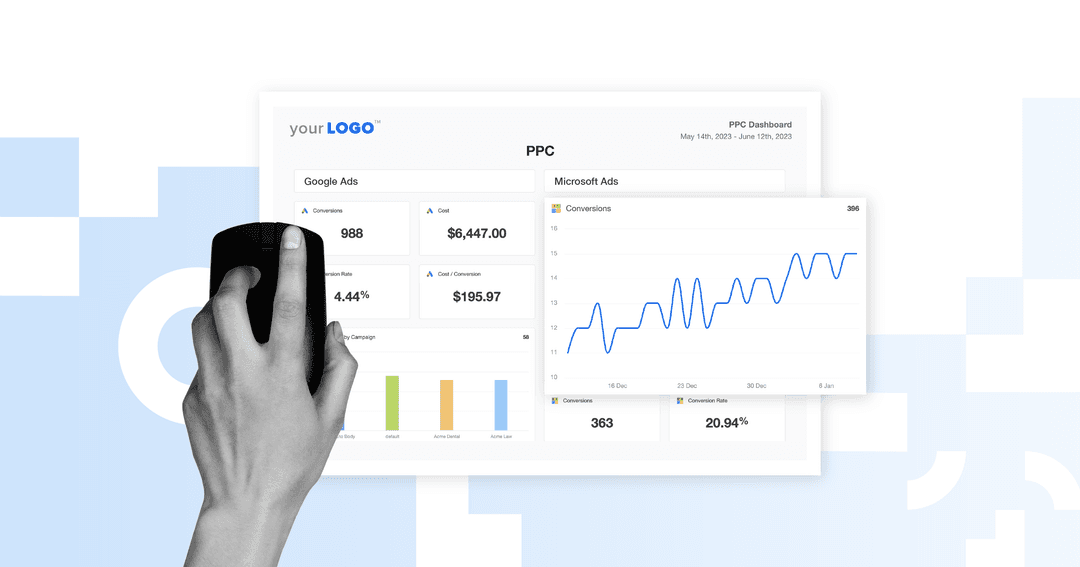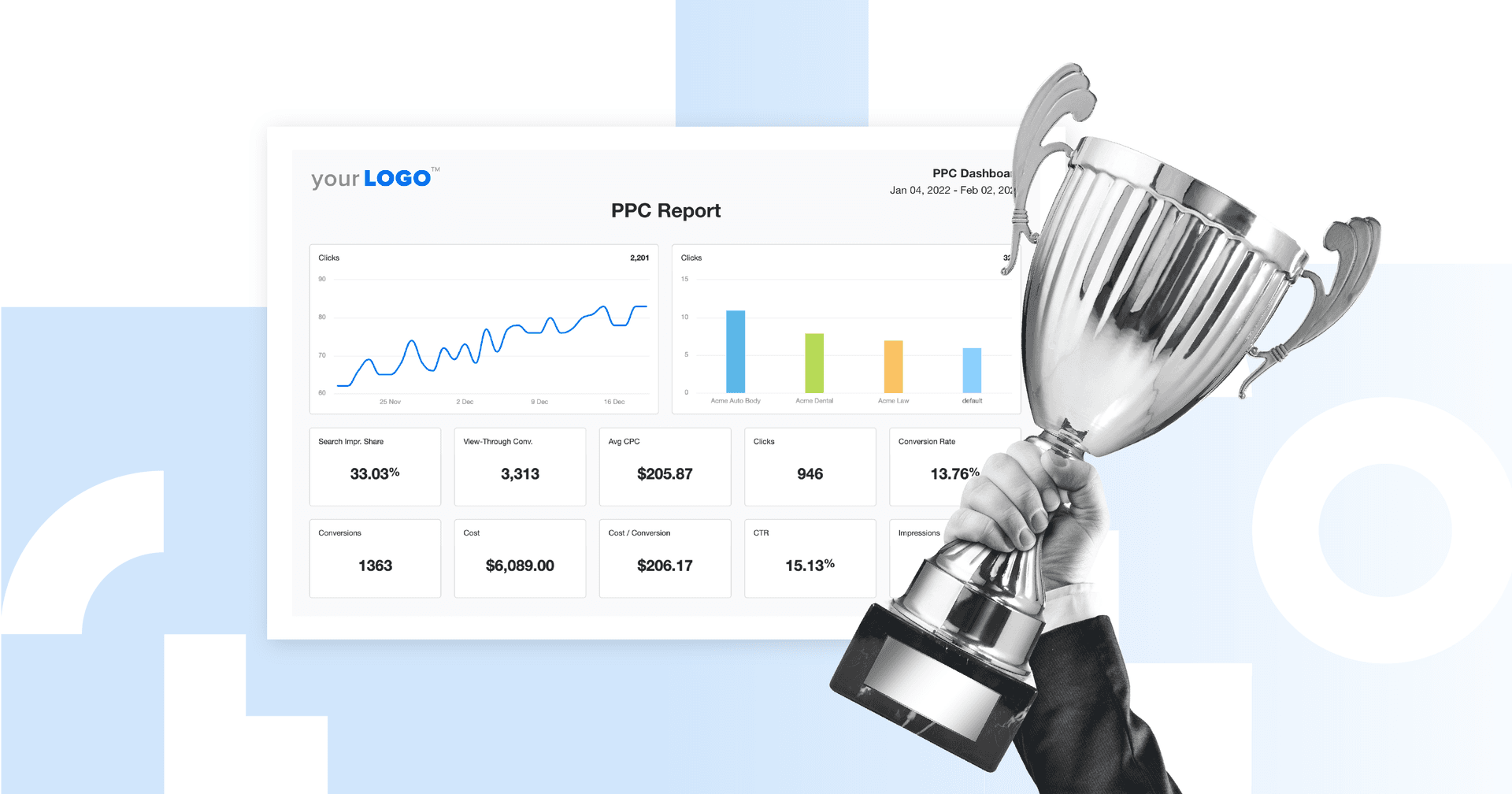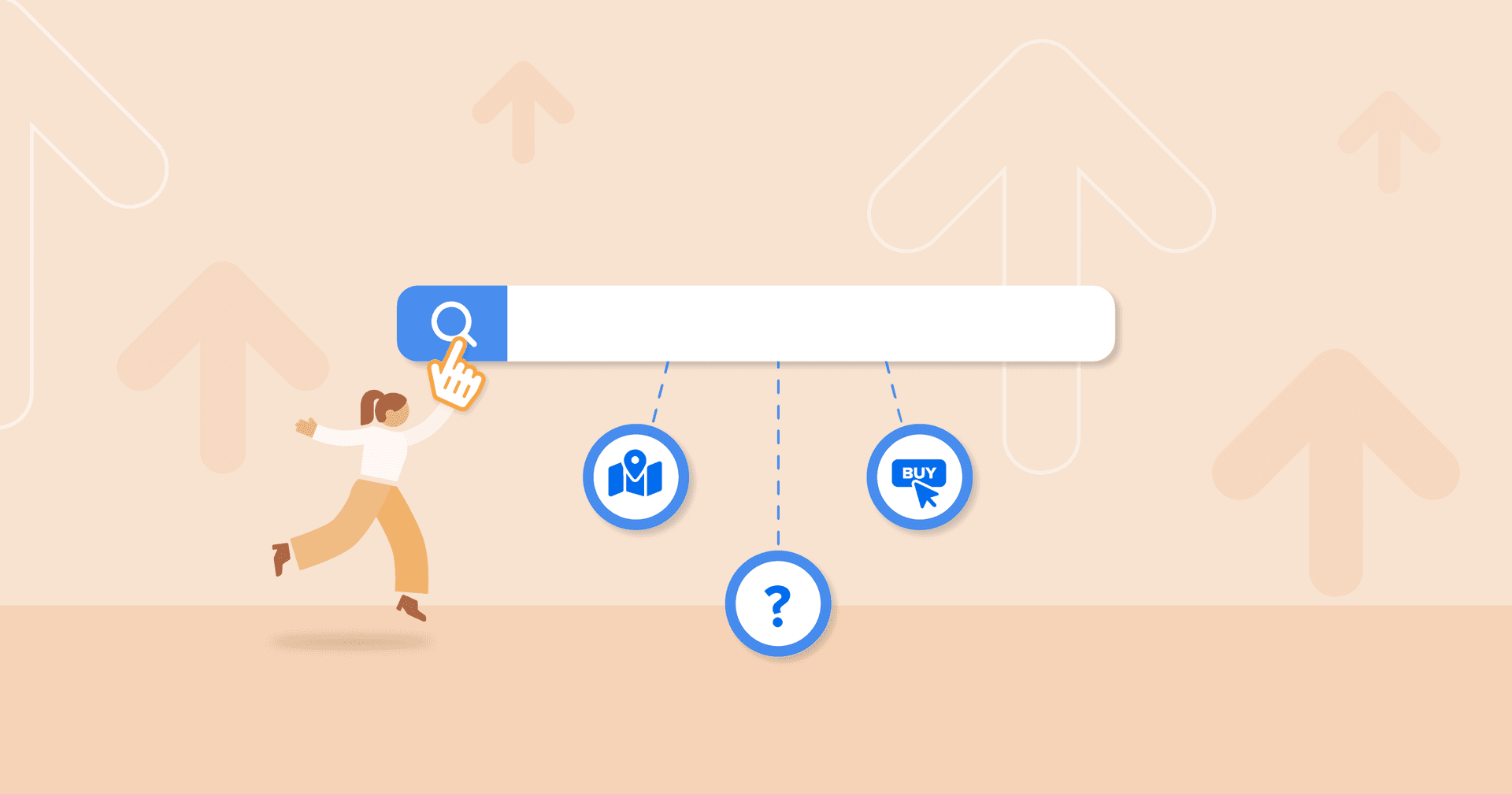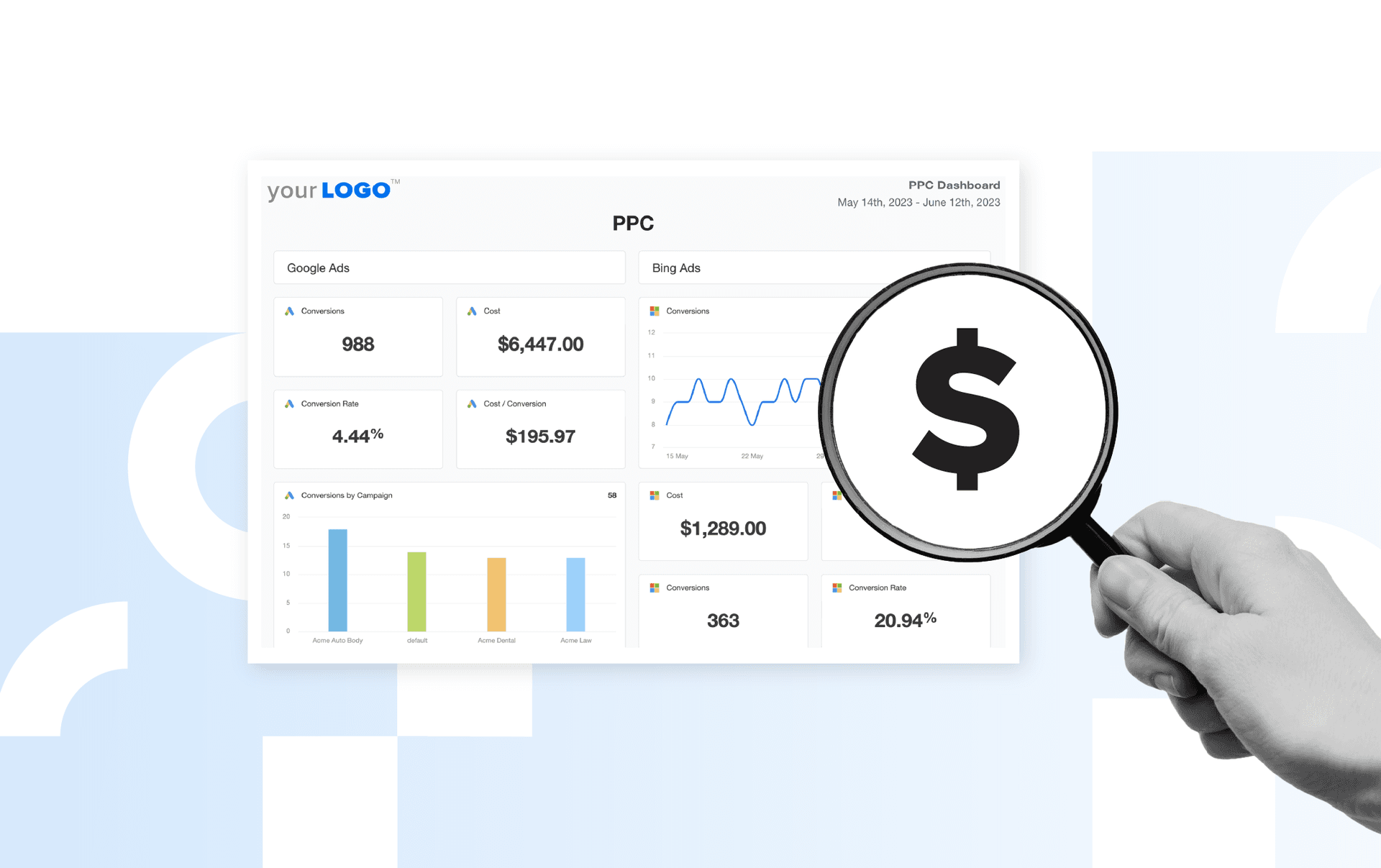Table of Contents
Table of Contents
- What Is Competitive PPC Analysis?
- Why Is PPC Competitor Analysis So Important?
- Effective PPC Competitive Analysis Tools to Spy on the Competition
- How To Identify Your PPC Competitors
- How To Do PPC Competitor Analysis & Research
- Free PPC Competitor Analysis Checklist
- What Is Included in the PPC Competitor Analysis Checklist
- Summary & Key Takeaways
7,000+ agencies have ditched manual reports. You can too.
Free 14-Day TrialQUICK SUMMARY:
PPC competitor analysis evaluates other brands' paid search campaigns to improve clients' ad performance. This process identifies optimal keywords and effective messaging strategies, ensuring efficient ad spend. Essential for agencies, PPC competitor analysis focuses on comparing strengths, weaknesses, and unique market positions to elevate client success.
PPC competitor analysis is an essential part of any successful PPC campaign. By regularly analyzing the competition, you ensure that you're targeting the right keywords, conveying your client's message in an engaging way, and that you're not overspending on ads.
If your client’s pay-per-click (PPC) ads are not performing as well as you had hoped, it likely has something to do with how your client is measuring up against competitor ads. Showcase your agency’s value and expertise by refreshing your strategy and giving those ads a boost!
If you’re not keeping a close eye on what your client’s competitors are up to, you could be missing huge areas of opportunity–especially when it comes to paid advertising. Maybe they’re trying a strategy that you should also be testing out for your clients. Stay proactive by noting their ad copy. Is it similar to your clients? Are they trying to pass themselves off as your client’s brand to convince users to click their ad?
To improve your client’s PPC campaigns, you need to start by looking at what their competitors are doing. By conducting a competitor analysis, you identify your client’s direct and indirect competition and how they operate–putting your clients in a better position to outrank their ad position on the search engine results page.
To save you some time and make things easier, we’ve created a free template you can download to keep tabs on your client’s competitors.
What Is Competitive PPC Analysis?
Paid search competitor analysis involves researching and evaluating competitors' strategies to uncover ways to improve your client’s PPC campaigns. While many PPC specialists focus on the basics, like tracking bids and keywords, a more detailed competitor PPC analysis will reveal overlooked insights.
For example, you might analyze competitor ads to discover trends in ad scheduling, showing when bids are highest and conversions peak. Combine this with impression share data to identify periods when your client’s ads lose visibility.
Plus, ad copy analysis and landing page reviews typically highlight competitors’ user experience advantages, such as faster load times or exclusive offers like free trials, which may drive higher conversion rates.
Don’t forget that competitive analysis isn't just about your client’s direct competitors. You may find new players targeting similar keywords or industries crossing over into your client’s audience.
Tools like Semrush, SpyFu, and Ahrefs Ads Explorer now include AI-driven ad intelligence features, letting you see a competitor’s entire ad history, budget shifts, and new creative trends in one dashboard. These platforms integrate cross-channel data—including Performance Max, LinkedIn Ads, and Microsoft Ads—to reflect the full competitive PPC analysis landscape.
At the end of the day, competitive PPC analysis is about understanding why competitors succeed and leveraging those insights to refine your own strategy. It’s about understanding the "why" behind competitors’ choices and adapting smarter, not harder, to compete effectively in the PPC world.
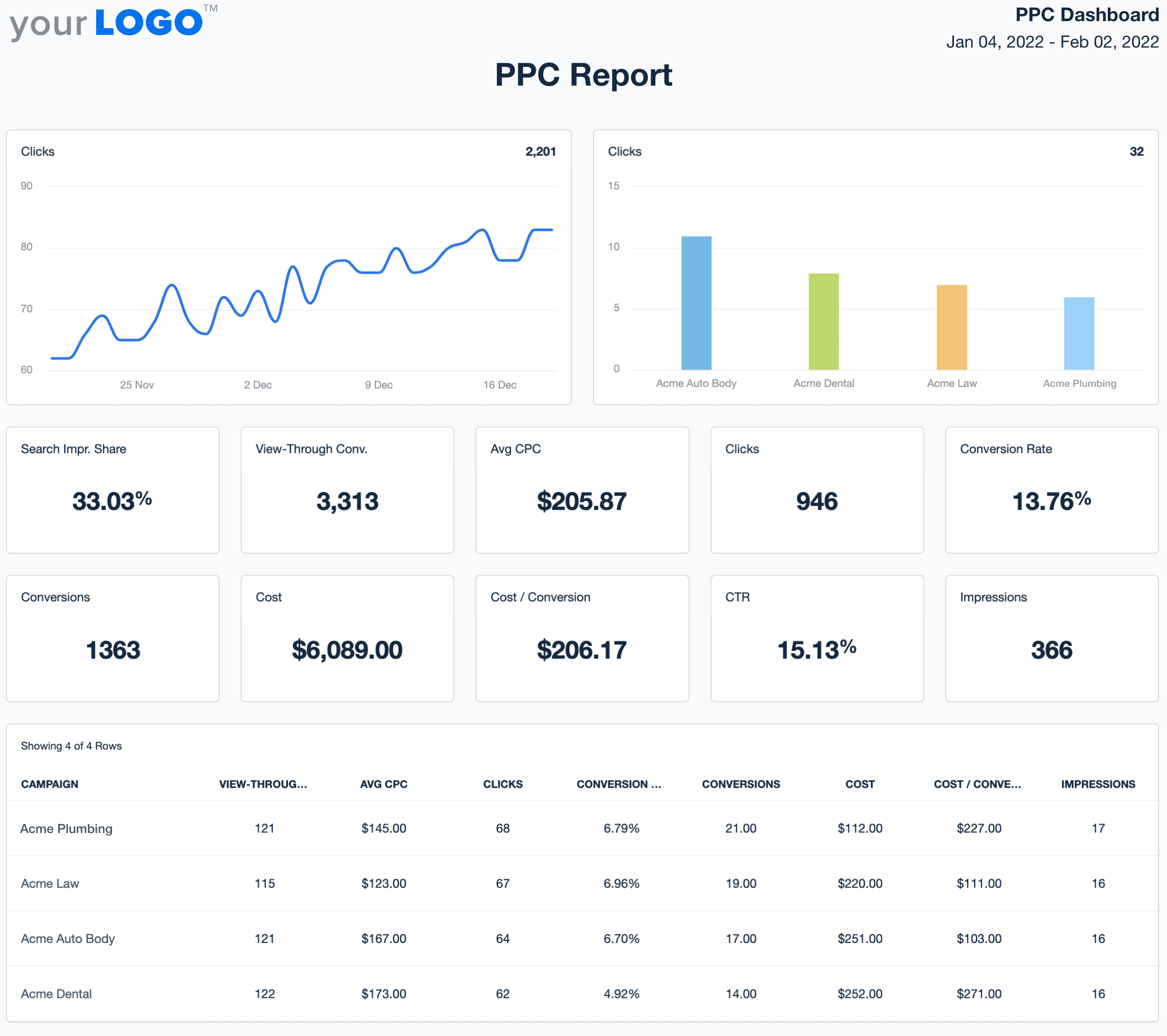
Create professional, easy-to-read PPC reports that clients will actually understand and look forward to receiving in their inboxes. Start your 14-day free trial today!
Why Is PPC Competitor Analysis So Important?
Competitor analysis should be an integral part of your agency’s strategy. After all, if you want to help your clients get ahead of their competitors, you need to compare strengths and weaknesses, and determine their point of difference in the market.
Competitor analysis is important because it:
Shows what keywords competitors are targeting and how much they are spending. Identifying gaps in your client’s PPC campaigns ultimately saves them money.
Helps your agency adjust marketing benchmarks to recognize opportunities to enhance your client’s strategy.
Reveals how to position your client’s business to keep their customers’ attention with things like new trends, changes, and ideas.
Gives your clients a competitive advantage by understanding their competitor’s ad copy and creative strategy.
AI-generated ad copy and automated bidding strategies have raised the stakes for paid search analysis. Agencies must track not just which keywords competitors use, but how AI systems optimize their ad creatives and bids over time. This deeper level of PPC competitor research helps your agency anticipate performance shifts rather than reacting to them.
When it comes to spending your client’s budget on paid search ads or any other paid marketing efforts, you can’t afford not to look into what their competitors are doing.
Effective PPC Competitive Analysis Tools to Spy on the Competition
First things first, what tools are available to complete your client’s competitor research?
Competitor analysis tools help your agency track, analyze and learn from their competitors' strategies. Use this information to boost your current marketing strategies to help them win big!
Our favorite tool for PPC competitor analysis is Semrush. It gives access to competitor PPC keywords, estimated traffic amounts, likely CPCs, etc. Also, for active search campaigns, Auction Insights in Google Ads is key to knowing how your campaigns are faring vs. your competition.
Stuart Pereira, Campaign Manager, WSI Comandix
There are a lot of tools out there, and knowing which one will work best for your client’s audience can be tricky. That’s why we’ve narrowed down our top choices that save you time while identifying valuable PPC data you might otherwise miss.
1. SpyFu
This PPC competitor analysis tool offers deeper insights into competitors’ ad history, bidding strategies, and AI-generated ad variations. Its “Kombat” feature identifies keyword gaps and untapped paid search opportunities—helping agencies find competitors’ keywords PPC advertisers are overlooking.
It also allows you to see every keyword they’re purchasing and every ad they’re running.
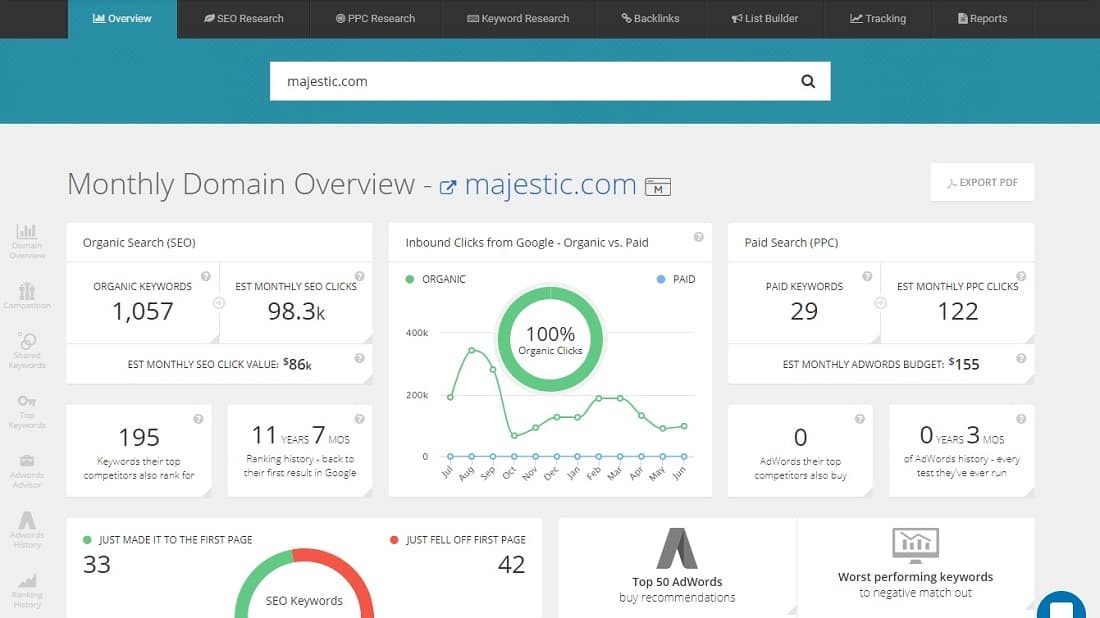
SpyFu lets you get a deeper understanding of the competitors’ ad strategies which can inform you how to optimize your clients.
2. Google Ads Auction Insights
This tool can only be used effectively when you’re running a live campaign for your clients. However, it can still provide you with actionable insights as long as you keep an eye on the Auction Insights tab regularly.
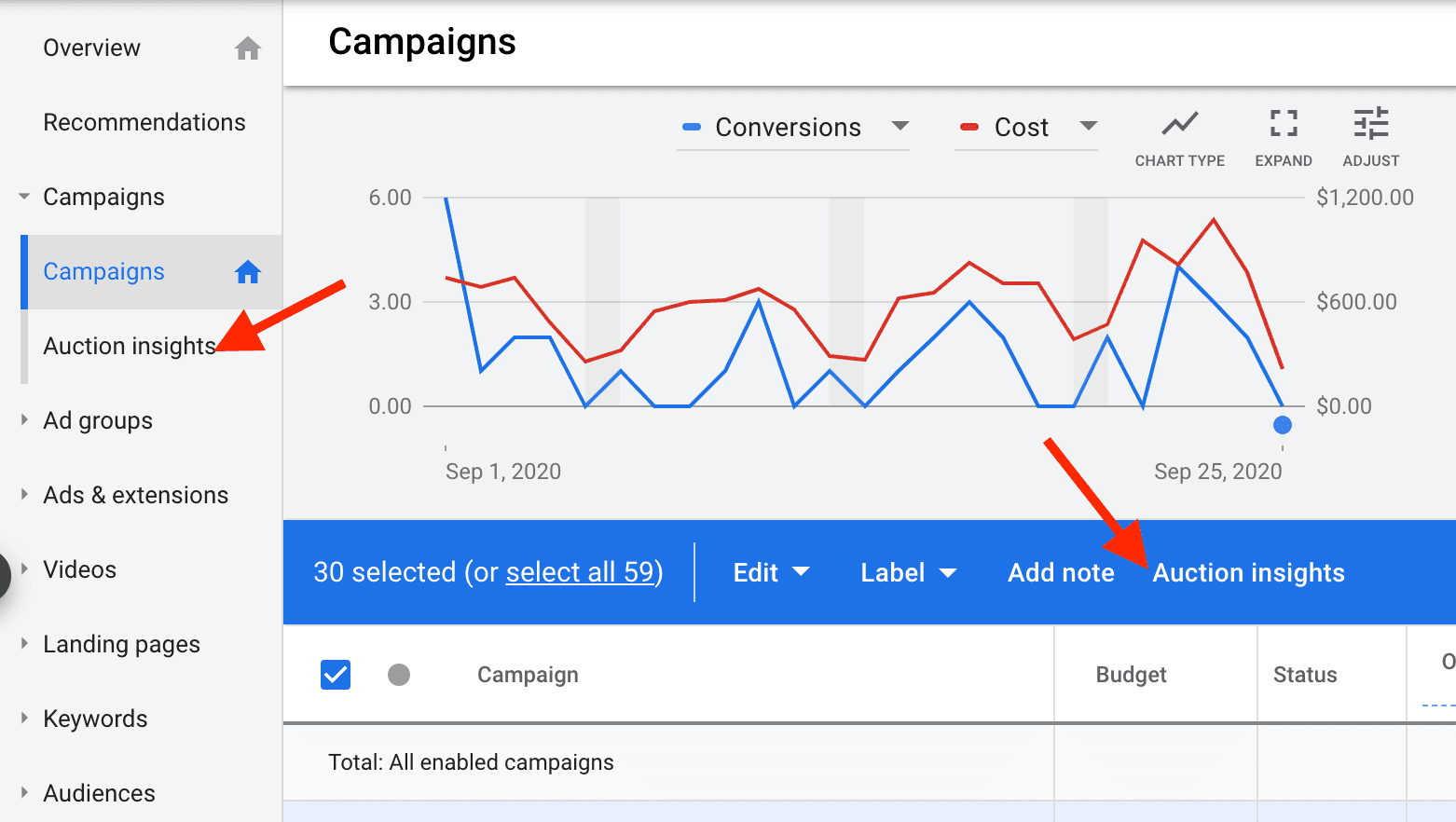
Basically, this tool lets you compare your client’s performance with other advertisers who are participating in the same auctions that you are.
3. Facebook Ad Library
Use Meta’s Advantage+ Creative Library (formerly Facebook Ad Library) to view and compare your competitors’ PPC ads across Meta platforms. This helps identify ad creatives, copy variations, and competitor’s ad strategies that are driving engagement. Combine these insights with LinkedIn Ads and Google Ads data for a holistic competitive paid search analysis.
Find out who created the ad, what it looks like, and when it ran.
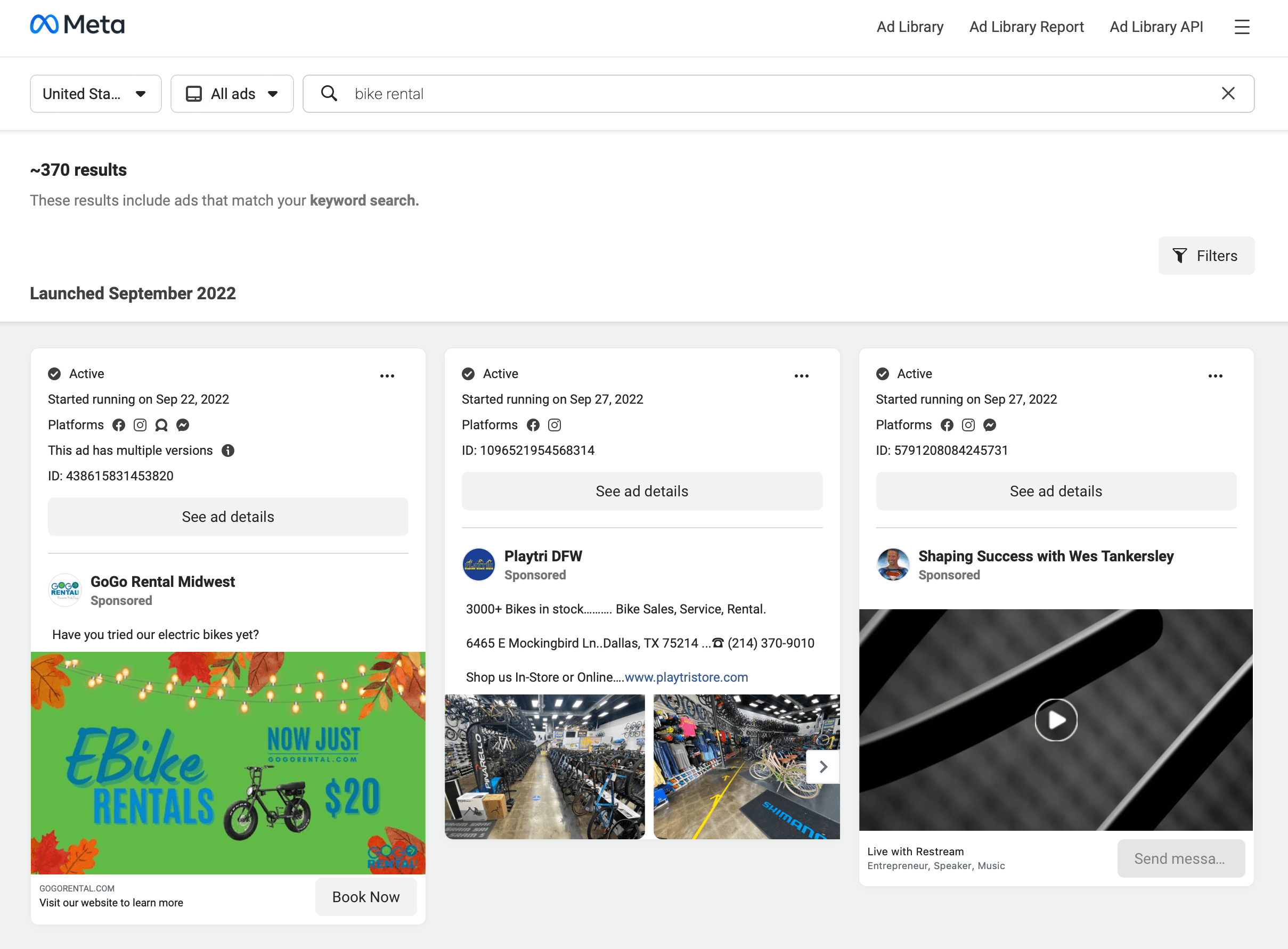
Make your client’s ads more effective by studying competitors' ads that are performing well.
4. Semrush
This tool helps you plan, analyze, and improve your client’s Google Ads campaigns. It includes features such as advertising and PLA research, PPC keywords tools, position tracking, and social media ad campaign tools.
All you need to do is enter a website and it will reveal information about your client’s biggest competitors, including top keywords and more.
Semrush also gives you insight into how much competitors are spending, although the accuracy can be debatable. At the end of the day, it’s a useful tool for clients that are advertising on multiple platforms.
The Semrush reporting tool in AgencyAnalytics automatically compiles your backlink reporting and quickly creates ready-to-send reports.
5. Ahrefs
Ahrefs expanded its paid tools in 2025, now including PPC competitor analysis features that show ad ranked higher, average position, and ad history for a competitor domain. These additions make it easier to analyze competitors’ keyword choices and drive relevant traffic with a stronger bidding strategy.. Their keyword explorer tool helps you discover countless keyword options while analyzing their competitiveness.
Plus, calculate traffic potential and other key metrics such as global search volume, location-specific search volume, and average clicks. Ahrefs is ideal for optimizing Google Ads campaigns and gives valuable insights on weak and low-potential keywords so you don’t waste your client’s budget.
AgencyAnalytics has five dedicated Ahrefs dashboards to track live updates in a clean interface.
Also review emerging PPC platforms such as Amazon Ads, TikTok Ads Manager, and LinkedIn Ads. Many top PPC competitors are expanding beyond Google Ads, targeting the same audience through multi-channel bidding. Understanding these shifts gives agencies a competitive edge when optimizing ad budgets and discovering new keyword overlap opportunities.
Making Time for PPC Competitor Analysis
In order to complete your client’s competitor analysis, you need to free up time to do so. The AgencyAnalytics platform integrates with over 80 marketing channels, including Google Ads, Microsoft Ads, Amazon, LinkedIn, and more.
Incorporate performance goals, paid search analytics, and custom metrics in your client reports and show how PPC campaigns across multiple channels are working together to reach your client’s overall goals. Then automate PPC reporting so these elements ship on schedule every month.
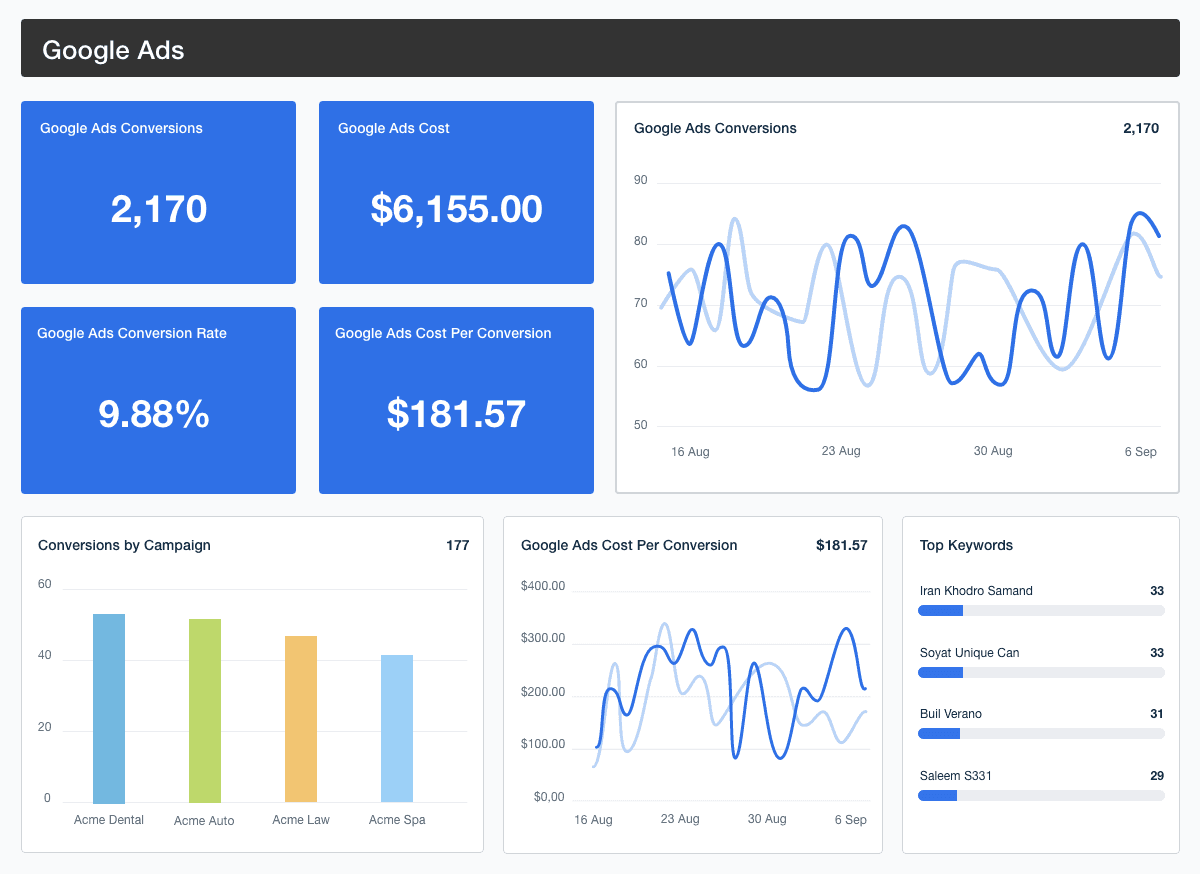
Using the tool reduces your agency’s reporting time by automating your reports, allowing you to spend your time analyzing your client’s competitors. New to AgencyAnalytics? Try automated reporting free for 14 days.
How To Identify Your PPC Competitors
This is arguably the most important step in your PPC competitor research. Without knowing how to identify your client’s competitors, how do you know where to start? Some important questions to ask yourself:
Who is going after the same keywords as your client?
Who is ranking in the top position and taking clicks away from your client?
You need to find out the answer to both of these questions–without searching for the keywords that they’re targeting to generate more online traffic. After all, you don’t want to be fueling your client’s competition!
This is when you use one of the PPC competitor analysis tools like the ones we mentioned above to gain insights into your client’s biggest threats.
We identify our client’s competitors by starting with keyword research. We run those keywords to see the top results, then we note the companies that are running ads based on our keyword list. The companies that repeatedly show up for our top keywords become the 'shortlist' of competitors we are trying to beat.
Brian Ferritto, Digital Marketing Specialist at 42connect.
Here are some questions to consider when it comes to your client’s competitors:
Who Is Your Client’s Competition?
In order to determine who your client’s competitors are, you need to dive into their specific business details. Think about what products or services they offer, where they are located, and what customers they serve. Your clients may have an idea of who their competitors are, but keep in mind that their offline competitors may be completely different than their online competitors.
Use Google Ads to uncover metrics such as impression share, top-of-page rate, outranking share, and more. By looking into these metrics, create a plan of action on areas your client needs to improve.
What Kind Of Competitors Are They?
It’s crucial to understand what kind of competitors they are as well. You don’t want to compare your client with someone with a significantly lower budget.
These are some of the common types of PPC competitors:
Direct competition: Those who are offering the same product or service as your client
Indirect competition: A product or service that solves a particular need, but in a different way.
Affiliates & Marketing Partners: Those who are promoting your client's brand or their competition. Usually for a commission fee.
Comparison Shopping Engines: An online platform that aggregates multiple products into one place for easy price and feature comparisons.
Search arbitrages: Those who bid on a keyword only to bring users to another search platform to drive more traffic.
Resellers: Other brands who may be selling your client's product or reselling their service.
Keep an eye on top branded PPC keyword trends or run a direct channel activity comparison between your client and their competitor’s domain to gain more insights.
Where Are They Competing With You?
It would be impossible to keep track of every place each competitor is advertising on the internet. When doing your competitor analysis, consider the following when determining where the most valuable place to spend your time is.
Platforms:
Are their ads primarily on Google Ads or Facebook Ads?
Do they have retargeting campaigns?
Location:
Are they competing locally, nationally, or internationally?
Timing:
Do they turn their ads off during the weekends?
Are their ads running during specific promotions or holidays?
Devices:
Are they more heavily focused on mobile, desktop, or a mix of both?
Agency Tip: Use labels within third-party or publishers’ bidding tools to oversee any changes in your client’s best-performing keywords. Try setting up automated alerts that deliver bidding recommendations to your inbox.
Why Are They Competing?
Depending on the type of competitor in the PPC mix, the intention behind the keyword targeting could change. For example, the purest form of direct competition is attempting to do the same thing as your clients–drive more revenue.
However, an affiliate or search arbitrager may be competing with your client’s ads in order to earn a small commission or click fee, which often means you can quickly bid them out of top placement. After all, their margins are typically much smaller than those of your client so they often can afford to spend as much to acquire those clicks.
Others may be trying to divert traffic from one brand (e.g. Nike) to another (e.g. Adidas).
Or competitors may be bidding on your client’s keywords as a defensive strategy just to price you out of the running.
However, it’s important to note that you might not get ahead of your client’s competitors with bidding alone. Because they may have the same intentions as you, use the competitor analysis tools to go beyond price and see what else the data is telling you. Then you’ll be able to adjust your strategy accordingly.
This could include changing bids, or it may help your agency drill deeper into some of the other parts that inform the Google Ads algorithm, such as improving CTRs, reducing bounce rates, and more.
How To Do PPC Competitor Analysis & Research
Completing a competitor analysis for PPC will not only inform your marketing strategies but show your clients your agency’s value.
Having these tools at our disposal means we can offer our clients a deeper analysis of their PPC account. By being able to carry out more in-depth competitor analysis, spanning more than just the auction, we can provide better decision-making and recommendations that more accurately reflect the market.
Claire Aldridge, Digital Marketing Specialist at Victory Digital.
After your client’s initial list of competitors is complete, you’ll want to look at these five areas to dive even deeper into their PPC competitors:
1. Identify Your Main Competitors
Start by identifying your client’s competitors in paid search. Keep in mind that these might not always align with their direct business competitors. Focus on brands bidding on similar keywords or targeting overlapping audiences using keyword research tools. For example, a local HVAC company’s competitors could include other HVAC providers, home improvement services, or big-box stores. Categorize competitors by relevance or budget scale to prioritize your efforts and gain clearer insights into their PPC strategies.
2. Find Competitors' PPC Keywords
Use a keyword research tool to determine search volume to figure out the potential reach of your client’s Google Search Ads. The tool should also help you understand the difficulty in getting to the top of the SERP and the CPC your client will need to pay.
3. Conduct PPC Landing Page Analysis
Keep an eye on competitors’ landing pages, but be sure not to copy exactly what they’re doing. Look for keywords and how their ad copy and CTAs reflect the words used in their ads. Also, note specific design elements and other user experience aspects to see what your client could improve on.
4. Evaluate Competitors’ AI Integration
Review whether competitors use automated ad copy tools or dynamic keyword insertion. Many advertisers now rely on Google’s AI asset generation or Performance Max to create adaptable ads. Tracking these changes provides insight into a competitor’s automation maturity and helps you fine-tune your own PPC campaigns for better budget optimization.
5. Analyze Website Quality
This is all about the functionality of your client’s website and how it compares to the competition. Consider things like how fast the competitor’s website loads. How consistent is their branding? Do they incorporate a variety of CTAs to catch additional leads such as a ‘schedule an appointment button? How easy is it to navigate around their website? Are their testimonials updated and easy to access?
6. Track Competitors’ Display Ads
Spend time visiting competitors’ websites. Most times, they will have remarketing campaigns running and you could gain some valuable insights into what their remarketing strategy looks like. Be sure to analyze images, ad copy, and CTAs that are being used to incorporate into your client’s strategies.
Free PPC Competitor Analysis Checklist
There’s a lot that goes into running a thorough analysis of PPC competitors, and you don’t want to miss some important details. Download the free checklist we’ve created below to ensure your client’s PPC campaigns are stacking up against their competitors:
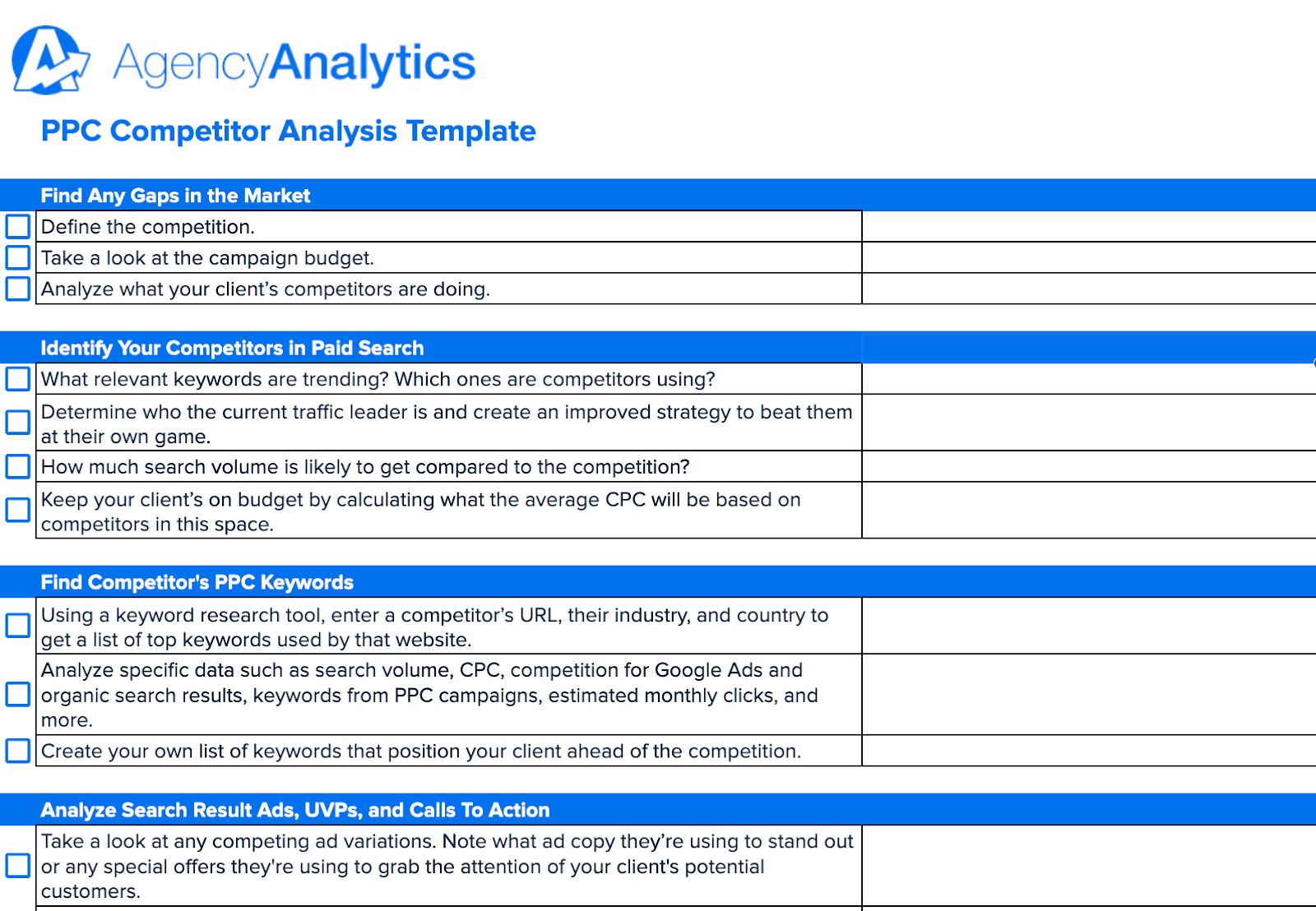
Add the Competitor Analysis Checklist to your agency’s SOPs and never miss out on competitor insights.
What Is Included in the PPC Competitor Analysis Checklist
A thorough PPC competitor analysis checklist helps marketers uncover opportunities to optimize their clients' campaigns and outperform the competition. Start by identifying competitors and understanding their strategies, budgets, and results to refine your own approach.
Below, we’ve broken down the key components you’ll need to create a comprehensive and actionable analysis.
Find Any Gaps in the Market
Define the competition, take a look at the campaign budget, and analyze what your client’s competitors are doing.
Identify Your Competitors in Paid Search
What relevant keywords are trending? Which ones are competitors using? Determine who the current traffic leader is and create an improved strategy to beat them at their own game. How much search volume is likely to get compared to the competition?
Calculate the average CPC based on competitors in this space to keep your clients on budget.
Find Competitor’s PPC Keywords
Using a keyword research tool, enter a competitor’s URL, their industry, and country to get a list of top keywords used by that website. Analyze specific data such as search volume, CPC, competition for Google Ads and organic search results, keywords from PPC campaigns, estimated monthly clicks, and more. Create your own list of keywords that position your client ahead of the competition.
Analyze Search Result Ads, UVPs, and Calls To Action
Review ad variations across Google Search, Display, and social platforms. Note if competitors are using responsive search ads, AI-generated creatives, or dynamic keyword insertion. Use PPC competitor analysis tools like Semrush’s AdClarity or SpyFu Ad History to assess how often competitors test creatives and shift messaging. This ad intelligence process reveals patterns in competitors’ PPC strategies, enabling your agency to refine its content strategy and bidding approaches.
Using tools that analyze the history of paid search ads provides a better understanding of what ad copy variations gave the best results. Analyze each competitor’s unique value proposition (UVP) by visiting their websites. Then, adjust your client’s UVP and improve it to make their product or service more valuable and unique.
Google Ads Auction Insights
Use Google Ads Auction insights if you’re running a PPC campaign and bidding on multiple AdWords terms. This helps you see where your client’s competitors appear and what your client’s impression share is. Use a keyword tool to reveal competitors' profitable keywords, what landing pages are generating the most traffic, and what ads they’re running.
Landing Page Experience
Evaluate the landing pages your client’s competitors are linking to their paid Google search ads. Landing page copy, call to action, and relevance all play a part in the results of the ad auction. Are competitors using specific keywords or phrases or a stronger CTA?
Conversion Funnel
Try comparing your client’s conversion funnels to their competitors. Tools like Finteza or Google Analytics allow you to look at ads, keywords, and landing pages and track any actions taken by users before making a purchase. Find out how competitors are converting traffic and what they’re offering to increase their CTR. Then update your client’s landing page or ad copy with these new insights.
Target Audience
Monitor online consumer behaviors and demographic information to detect trends that may be affecting your client’s PPC campaigns.Your client’s ICP should not match their competitors’. Understand the differences and create audience segments. Identify and underserved audiences you may be missing. The business you thought would be the biggest competitor may only have a small audience overlap.
Analyze Seasonal Fluctuation
Keep note of which keywords get the most traffic during certain seasons, as this shows you which months are the busiest in your client’s industry and informs you on future PPC planning.
Improve Your Multi-Device Strategy
Mobile and cross-device behavior now directly influence ad rankings. Use Google Pagespeed Insights and Meta mobile benchmarks to review landing page quality and conversion rates across devices. Optimize both mobile and desktop ads with audience-specific creative, ensuring each device drives relevant traffic efficiently. Cross-check with competitor PPC analysis data to understand which devices your competitors bid most aggressively on.
Continue to Spy on Competitors
Agencies should now perform competitive PPC analysis monthly, especially in AI-driven PPC arenas where bidding strategies, ad creatives, and competitor’s keyword choices evolve quickly. Use automated PPC reporting tools to track shifts in competitors’ campaigns and uncover keyword gaps and untapped keywords early. Regular updates help your team make informed decisions and maintain a sustainable competitive advantage.
Clearly communicate your agency’s success in driving ROI with a customizable Amazon Ads Report Template or a professional Google Ads Report Template. Try AgencyAnalytics free for 14 days!
Summary & Key Takeaways
Knowing your client’s PPC competition is an important part of improving their overall paid campaigns. But it’s not the “end all be all.” Besides, you’re not going to win everything!
It’s important not to fully trust everything a tool is telling you as none of these tools have direct access to your client’s competitor accounts. They simply compile information from search engines and provide an insight into what’s going on in the world of paid digital advertising.
However, modern competitive research now goes beyond keywords—it’s about understanding competitors’ intent, automation, and audience strategy. Combining paid search analysis, ad intelligence tools, and backlink analysis gives agencies a 360° view of the PPC landscape. That means smarter bidding strategies, refined keyword targeting, and higher conversion rates—without increasing ad spend.
Looking to streamline your PPC reporting to free up some time to complete competitor analysis? Create automated cross-channel PPC reports, and custom dashboards with AgencyAnalytics. Show your clients the ROI you’re delivering with a PPC report and start your free 14-day trial today!
PPC Competitor Analysis FAQs
Everything agencies need to refine their PPC competitor research and outperform in the paid search arena.
Competitive PPC analysis is the ongoing process of evaluating other brands’ ad campaigns to strengthen your own PPC strategy. This means tracking competitors’ keywords, AI bidding behaviors, and creative testing patterns. A well-run ppc competitor analysis reveals which target keywords and ad creatives drive the best conversion rates, helping agencies allocate ad budgets efficiently.
By understanding shifts in your competitors’ PPC landscape, you make informed decisions that boost ad performance and uncover untapped opportunities.
Because PPC algorithms and AI bidding models evolve rapidly, conduct competitor PPC analysis at least once per month. Monitoring competitors’ campaigns frequently helps identify keyword overlap, changes in bidding strategies, and new ad creatives.
Regular tracking enables faster adaptation and ensures your own PPC campaigns stay competitive. For high-volume industries with fluctuating paid traffic, weekly audits may offer an even stronger competitive edge.
Leading PPC competitor analysis tools include Semrush, SpyFu, and Ahrefs Ads Explorer. Each offers visibility into competitors’ ad history, keyword gaps, and paid traffic distribution. For social and video ad intelligence, explore Meta Advantage+ Creative Library and LinkedIn Ads Analytics.
These tools help agencies find competitors’ keywords PPC advertisers rely on, benchmark costs, and analyze ad positions and ad budgets. A balanced toolset ensures complete competitive paid search coverage.
By reviewing landing pages, you understand how top PPC competitors convert traffic more effectively. Examine page speed, call-to-action design, and content structure. Use this analysis to improve on-page optimization and enhance your own online marketing efforts.
Tracking competitors’ PPC strategies also helps uncover untapped keywords and messaging gaps. The result? Stronger content strategy, higher conversion rates, and data-backed confidence for your future campaigns.
Effective ppc competition analysis isn’t just about keywords—it’s about people. When agencies analyze target audiences, they uncover what messages convert and which marketing strategies truly resonate. By combining insights from the Facebook Ads Library, display networks, and social remarketing tools, you’ll identify how own ads stack up against major competitors targeting the same segments.
Understanding target audience behavior leads to stronger campaign personalization, more relevant copy, and higher CTRs. This audience-centered approach positions agencies to outpace rivals in an increasingly competitive landscape while delivering meaningful results for clients.
Understanding how competitors bid and where brands vying for the same audience invest their ad spend reveals more than just keyword costs—it uncovers intent. By analyzing your target audience alongside each advertiser’s ad, your agency identifies not only what converts but why it converts.
Reviewing this data across own campaigns highlights untapped opportunities, while balancing spend between direct traffic and broader paid reach ensures sustainable growth. The goal isn’t to outspend; it’s to outsmart—making smarter budget choices that align with client goals and maximize returns in today’s highly competitive PPC arena.
A complete view of your competitors’ PPC campaigns helps refine your agency’s overall keyword strategy. Start by reviewing competitor keywords across multiple channels to reveal keyword gaps and discover new keywords worth testing. Examine how competitor’s ads perform on the search engine results pages, and track both organic and paid traffic to see which keywords generate the most engagement.
Layering this insight into your clients’ PPC advertising approach ensures smarter targeting, better ad alignment, and more efficient ad budgets. The goal: make data-driven improvements that turn competitive research into a sustainable growth advantage for every client campaign.
Competitor research is the foundation for a performance-driven marketing strategy that consistently generates leads. By comparing branded keywords, indirect competitors, and certain keywords across campaigns, your agency gains a complete picture of where opportunities exist.
This process sharpens target audience understanding, clarifies your competitive landscape, and reveals how industry trends influence bidding patterns. Studying own ads alongside top performers also uncovers ways to capture paid and organic traffic efficiently.
When done consistently, this insight empowers smarter ad budget allocation and gives clients a durable advantage.

Written by
Richelle Peace is a writer with a degree in Journalism who focuses on web content, blog posts, and social media. She enjoys learning about different topics and sharing that knowledge with others. When she isn’t writing, Richelle spends time teaching yoga, where she combines mindfulness, movement, and her passion for wellness.
Read more posts by Richelle PeaceSee how 7,000+ marketing agencies help clients win
Free 14-day trial. No credit card required.



